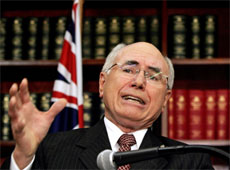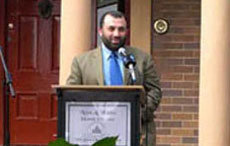|
Aussie Muslims Say Targeted by New Terror Laws
 |
|
"In
other circumstances I would never have sought these additional
powers," Howard said. (Reuters)
|
SYDNEY,
September 27, 2005 (IslamOnline.net & News Agencies) - Australia
is to impose draconian counter-terrorism laws after Prime Minister
John Howard won unanimous support from state premiers Tuesday,
September 27, for the laws dubbed unfair by Muslims.
Trying
to justify the new laws, Queensland state premier Peter Beattie told a
news conference, "In many sense the laws that we have agreed to
today are draconian laws, but they are necessary laws to protect
Australians," Reuters reported.
Describing
the legislation as "unusual laws because we live in unusual
circumstances", Howard said the London bombings in July had
brought home the "chilling reality" that "terrorist
attacks" could be staged by a country's own citizens, reported
Agence France-Presse (AFP).
"We
are worried there are people in our country who might just do
this," Howard told a news conference after a meeting with the
Council of Australian Governments.
The
laws include tighter checks on citizenship applicants, jail terms for
inciting violence, detention of suspects without charge for up to two
weeks, and curtailing suspects' movements and contacts for up to a
year.
They
also will provide police with greater stop, search and question
powers. But they will be reviewed after five years and include a
10-year "sunset clause", after which they would have to be
dropped, altered or renewed, Howard said.
Muslims
Concerned
 |
|
"They
have the potential of creating a fascist state and have the
potential to divide society dramatically," Trad said.
|
A
prominent moderate Islamic leader, Keyser Trad of the Islamic
Friendship Association, immediately condemned the laws and said they
targeted Muslims.
"They
have the potential of creating a fascist state and have the potential
to divide society dramatically," he told AFP.
"I
am quite frightened by these laws," he said, suggesting that they
could be used against people who criticized government policy such as
the deployment of troops to Iraq.
Australia
has never suffered a major peacetime attack on home soil, but 88
Australians were among 202 people killed in the 2002 Bali bombings and
10 Indonesians were killed when the Australian embassy in Jakarta was
hit by a suicide bomb on September 9, 2004.
While
Howard denied the laws target Australian Muslims, he acknowledged
Tuesday that he had been shaken by the fact that the London attacks,
which killed more than 50 people, were carried out by British-born men
who spoke with English accents and "played cricket".
In
the wake of the attacks, Howard last month called a meeting with 13
senior Muslim leaders to map out a joint approach to curbing extremism
within the 300,000-strong Islamic minority, and obtained pledges of
loyalty to Australia.
But
he was criticized for excluding Muslims considered "radical"
and several Islamic leaders have protested that Muslims feel they are
being singled out.
"The
feeling of the general Muslim population in Australia is that we are
being collectively punished for actions that are beyond our
control," Zachariah Matthews, head of Australian Islamic Mission,
a charitable organization, told AFP.
Howard,
on his part, said Australia faced a "shadowy and elusive
enemy".
"In
other circumstances I would never have sought these additional powers,
I would never have asked the premiers of the Australian states to
support me in enacting these laws," Howard said.
"But
we do live in very dangerous and different and threatening
circumstances and a strong and comprehensive response is needed."
The
government will also ask the national counter-terrorism committee to
develop "a chemical, biological, radiological and nuclear
strategy, bearing in mind the potential challenge of those agencies
and properties in the terrorist environment", he said.
No
Serious Threat
Strange
enough, the new tough laws coincided with statements by the head of
International Crisis Group Gareth Evans saying a South East
Asian-based network behind a string of deadly bombings against
westerners, Jemaah Islamiyah, is no longer a serious threat to
Australia.
The
network blamed for the Bali nightclub bombings and the suicide
bombings of the Australian embassy and Jakarta's Marriott hotel, has
had its power greatly reduced by police and intelligence work, Evans
says in a speech to be delivered later Tuesday, according to AFP.
He
says the International Crisis Group's perception is that "the JI
regional division that covered Australia has been effectively smashed
by Indonesian police and intelligence operations, well supported by
Australian agencies, and that JI itself no longer poses a serious
threat in Indonesia or elsewhere".
"The
fugitive Malaysian bomb-makers for the embassy attack -- Noordin and
Azahari -- may be tempted by another western target in Indonesia, but
a household-name US enterprise is seen as more likely than anything
identifiably Australian."
Australia
ranked "well behind the US and UK in the terrorist
wish-lists" although its profile had been raised by Canberra's
support for the US and the contribution of troops to Iraq, the former
Australian foreign minister says.
"All
I can say is that such information and analysis as is available to me
suggests that the threat to Australians at home and abroad is real but
moderate," Evans says.
Evans
says that while the threat of terror attacks should never be
underestimated, he is dubious of the intelligence governments receive
on terrorism.
"...
I maintain a special reservoir of beady-eyed skepticism toward most
products of the intelligence community -- especially the most
glittering," he says.
"...
none of us, least of all governments, know nearly as much as we would
like to know, or sometimes say we know..."
Evans
says governments must not become so spooked by terror threats that
they fundamentally change their nation's way of life.
"Extreme
and immediate risks may require extreme behavioral change, but lesser
risks don't, and it is important that governments try as best as they
can to calibrate and explain the risks as they are perceived at any
given time," he says.
|